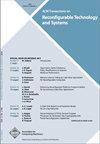Tailor : Altering Skip Connections for Resource-Efficient Inference
IF 2.8
4区 计算机科学
Q2 COMPUTER SCIENCE, HARDWARE & ARCHITECTURE
引用次数: 2
Abstract
Deep neural networks use skip connections to improve training convergence. However, these skip connections are costly in hardware, requiring extra buffers and increasing on- and off-chip memory utilization and bandwidth requirements. In this paper, we show that skip connections can be optimized for hardware when tackled with a hardware-software codesign approach. We argue that while a network’s skip connections are needed for the network to learn, they can later be removed or shortened to provide a more hardware efficient implementation with minimal to no accuracy loss. We introduce Tailor , a codesign tool whose hardware-aware training algorithm gradually removes or shortens a fully trained network’s skip connections to lower their hardware cost. Tailor improves resource utilization by up to 34% for BRAMs, 13% for FFs, and 16% for LUTs for on-chip, dataflow-style architectures. Tailor increases performance by 30% and reduces memory bandwidth by 45% for a 2D processing element array architecture.裁剪:为资源效率推断改变跳过连接
深度神经网络使用跳跃连接来提高训练收敛性。然而,这些跳过连接在硬件上是昂贵的,需要额外的缓冲区,增加片上和片外内存的利用率和带宽需求。在本文中,我们展示了当使用硬件软件协同设计方法处理时,跳过连接可以针对硬件进行优化。我们认为,虽然网络的跳过连接是网络学习所必需的,但它们可以在以后被删除或缩短,以提供一个更有效的硬件实现,并且最小到没有精度损失。本文介绍了协同设计工具Tailor,该工具的硬件感知训练算法逐步去除或缩短完全训练好的网络的跳过连接,以降低其硬件成本。对于片上数据流风格的架构,Tailor可将bram的资源利用率提高34%,ff的资源利用率提高13%,lut的资源利用率提高16%。Tailor将2D处理元素阵列架构的性能提高30%,并将内存带宽降低45%。
本文章由计算机程序翻译,如有差异,请以英文原文为准。
求助全文
约1分钟内获得全文
求助全文
来源期刊

ACM Transactions on Reconfigurable Technology and Systems
COMPUTER SCIENCE, HARDWARE & ARCHITECTURE-
CiteScore
4.90
自引率
8.70%
发文量
79
审稿时长
>12 weeks
期刊介绍:
TRETS is the top journal focusing on research in, on, and with reconfigurable systems and on their underlying technology. The scope, rationale, and coverage by other journals are often limited to particular aspects of reconfigurable technology or reconfigurable systems. TRETS is a journal that covers reconfigurability in its own right.
Topics that would be appropriate for TRETS would include all levels of reconfigurable system abstractions and all aspects of reconfigurable technology including platforms, programming environments and application successes that support these systems for computing or other applications.
-The board and systems architectures of a reconfigurable platform.
-Programming environments of reconfigurable systems, especially those designed for use with reconfigurable systems that will lead to increased programmer productivity.
-Languages and compilers for reconfigurable systems.
-Logic synthesis and related tools, as they relate to reconfigurable systems.
-Applications on which success can be demonstrated.
The underlying technology from which reconfigurable systems are developed. (Currently this technology is that of FPGAs, but research on the nature and use of follow-on technologies is appropriate for TRETS.)
In considering whether a paper is suitable for TRETS, the foremost question should be whether reconfigurability has been essential to success. Topics such as architecture, programming languages, compilers, and environments, logic synthesis, and high performance applications are all suitable if the context is appropriate. For example, an architecture for an embedded application that happens to use FPGAs is not necessarily suitable for TRETS, but an architecture using FPGAs for which the reconfigurability of the FPGAs is an inherent part of the specifications (perhaps due to a need for re-use on multiple applications) would be appropriate for TRETS.
 求助内容:
求助内容: 应助结果提醒方式:
应助结果提醒方式:


